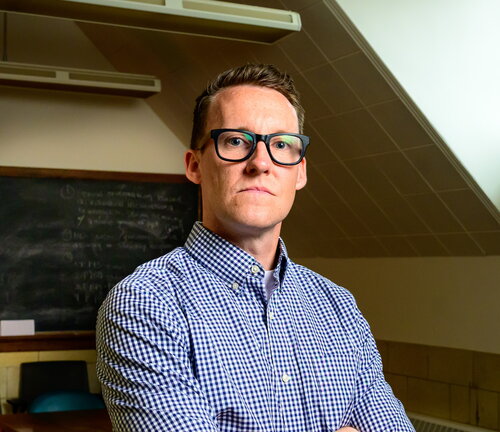
Biography
I joined the faculty at Illinois in 2023, having taught previously at Florida State University (2013-2023) and Mount St. Mary's University (2010-2013). From 2021-2022 I was a Visiting Faculty Fellow at the Notre Dame Institute for Advanced Study, and from 2022-2024 I am a Guest Researcher at the University of Leipzig, supported by a Fellowship for Experienced Researchers from the Alexander von Humboldt Association. From 2018-2021 my research was supported by an Academic Cross-Training Fellowship from the John F. Templeton Foundation.
Research Interests
Philosophy of mind and action, moral psychology, ethics, philosophy of language, philosophy of cognitive science, experimental philosophy
Research Description
The focus of my current research is the philosophy of action, especially as it bears on normative ethics and moral psychology. In particular, much of my recent work has been a response to Elizabeth Anscombe’s call for a sound “philosophy of psychology” to provide the needed foundation for philosophical moral theory. My guidebook to Anscombe’s Intention, published in 2019 by Oxford University Press, made a major contribution to this effort, and since then I have developed it in two directions: through a series of papers on practical reasoning, intention for the future, and the puzzle of how to account for the possibility of failing to act as one intends; and through a book project, with the title Describing Human Action, that draws on research in linguistics and experimental philosophy to address fundamental questions in the philosophy of action. I also have active research projects in the philosophy and science of perception, self-consciousness and first-person thought, and the philosophy of ordinary language.
Education
Ph.D. University of California, Berkeley
M.A. University of Notre Dame
B.A. Catholic University of America
Additional Campus Affiliations
Professor, Philosophy
External Links
Highlighted Publications
Books:
Reading Philosophy: Selected Texts with a Method for Beginners, 2nd edition. S. Guttenplan, J. Hornsby, C. Janaway, J. Schwenkler. Wiley-Blackwell, 2021
Becoming Someone New: Essays on Transformative Experience, Choice, and Change. E. Lambert and J. Schwenkler, eds. Oxford University Press, 2020
Anscombe’s Intention: A Guide. Oxford University Press, 2019
Articles and chapters:
“How Temptation Works”, Journal of Ethics and Social Philosophy, forthcoming
“Knowledge of Language as Self-Knowledge”, Inquiry, forthcoming
“Cause, ‘Cause’, and Norm” (J. Schwenkler*, E. Sievers), in Willemsen and Wiegmann, eds., Advances in Experimental Philosophy of Causation, 123-44
“One: But Not the Same” (J. Schwenkler*, N. Byrd, E. Lambert, M. Taylor), Philosophical Studies 179 (6), 1939-51
“What is the Bearing of Thinking on Doing?” (M. Bierson*, J. Schwenkler), in Wiseman and Haddock, eds., The Anscombean Mind, 312-32
“Risking Belief”, in Lambert and Schwenkler, eds., Becoming Someone New: Essays on Transformative Experience, Choice, and Change, 196-211
“Are Perspectival Shapes Seen or Imagined? An Experimental Approach” (J. Schwenkler, A. Weksler), Phenomenology and the Cognitive Sciences 18, 855-77
“Intending Is Believing: A Defense of Strong Cognitivism” (B. Marušić, J. Schwenkler), Analytic Philosophy 59, 309-40
“Understanding ‘Practical Knowledge’”, Philosophers’ Imprint 15, 1-32
“Conscious Vision in Action” (R. Briscoe, J. Schwenkler), Cognitive Science 39, 1435-67
“Vision, Self-Location, and the Phenomenology of the ‘Point of View’”, Noûs 48, 137-55
“Do Things Look the Way They Feel?”, Analysis 73, 86-96
“Does Visual Spatial Awareness Require the Visual Awareness of Space?”, Mind & Language 27, 308-29
Recent Publications
Schwenkler, J. (2025). How to contradict an expression of intention. In Practical Truth: Historical and Contemporary Perspectives (pp. 222-237). Oxford University Press. https://doi.org/10.1093/9780197634424.003.0013
Schwenkler, J. (2024). Knowledge of language as self-knowledge. Inquiry (United Kingdom), 67(10), 4078-4102. https://doi.org/10.1080/0020174X.2022.2074888
Schwenkler, J. (2024). The categories of causation. Synthese, 203(1), Article 9. https://doi.org/10.1007/s11229-023-04409-7
Zahorec, M., Bishop, R., Hansen, N., Schwenkler, J., & Sytsma, J. (2023). Linguistic Corpora and Ordinary Language: On the Dispute Between Ryle and Austin About the Use of ‘Voluntary’, ‘Involuntary’, ‘Voluntarily’, and ‘Involuntarily’. In D. Bordonaba-Plou (Ed.), Experimental Philosophy of Language: Perspectives, Methods, and Prospects (pp. 121-149). (Logic, Argumentation and Reasoning; Vol. 33). Springer. https://doi.org/10.1007/978-3-031-28908-8_7
Marušić, B., & Schwenkler, J. (2022). Agency and evidence. In L. Ferrero (Ed.), The Routledge Handbook of Philosophy of Agency (pp. 244-252). (Routledge Handbooks in Philosophy). Routledge. https://doi.org/10.4324/9780429202131-28